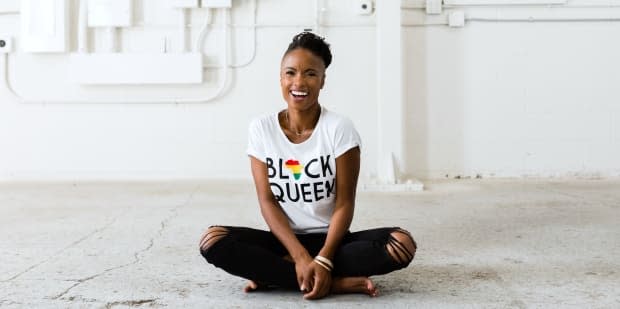Africa Centre launches free therapy program for Black Albertans
On her journey to find a suitable therapist, Edmontonian Odion Welch spent 15 minutes of an hour-long counselling session explaining to her white psychologist about plantain — the fried banana common at the dinner table in her Caribbean household.
She went through seven counselors before finding the right one because of the barriers of cost, accessibility and most importantly — finding someone who understood her Black culture.
"Who do you talk to about that experience?" asked Welch, a mental health youth coordinator with the Africa Centre.
Welch is now part of efforts at the Africa Centre that will make it easier for other Black Albertans to find a therapist who can better relate to their experiences. The organization has launched a free counselling clinic to support Albertans of African descent dealing with the impact of COVID-19.
"There's a safe one hour conversation that someone can have that's either going to be a safe venting session or a place where they leave with resources and that almost kind of virtual hug that someone gets it," Welch said.
In partnership with Alberta Black Therapists Network and funded by United Way, the program is the first of its kind in Western Canada to provide free, culturally-relevant counselling services for Black community members.
With many appointments available on evenings and weekends, the sessions are solely virtual right now due to COVID-19 with future plans for in-person sessions.
The team of all-Black therapists speak a total of nine different languages. Access to multilingual Black therapists is just one of the ways the program aims to reduce barriers identified during consultations to accessing mental health support.
As well as having therapists who better understand the cultures or systemic racism, their lived experience also makes them more sensitive to the reality of microaggressions, pre-migration or intergenerational trauma clients may face.
"The most common microaggression that I feel like Black people talk about is the hair, petting the hair and 'Oh I can't believe it feels like this'," Welch said.
"We have so many of our youth talk about — they still have teachers say to them, 'You're smart for a Black person'."
'Rocking your natural hair'
Welch, an entrepreneur who overcame her own struggle with depression, anxiety and suicidal thoughts, self-published a best-selling book on Amazon: Breakthrough: A Courageous True Story of Overcoming Depression and Anxiety.
She highlights the pressures Black women feel whether it's being a good spouse, parent and career woman; fulfilling family expectations; sexual trauma and body image; or concerns about coming across as the "angry Black woman" or "rocking your natural hair."
Current events such as the video repeatedly played of the murder of George Floyd can add to that trauma, said Welch.
She pointed out that the last segregated school in Canada only closed in the 1980s and noted Edmonton's history of white supremacy lives on today, with racist eruptions repeatedly grabbing headlines.
"So if you're a parent, there's only two generations before me that went through those things and saw the segregation and heard the comments and came from a time where, you know, 'If it's Black, it ain't right' kind of thing," Welch said.
Jasmine Duncan, an entrepreneur and single mother of three children who struggled to find a Black therapist for her own family, welcomed the new program.
"I think it's important, especially for our children to see somebody who looks like them, kind of representing them and understanding what it's like for them," Duncan said. "Even for myself, when I get therapy it's hard to really explain some of the things that you're going through or that you feel if somebody has never experienced anything like it, and it's not something you can really read in a textbook."
"When it comes to racism, you can express the things that you have been through or the way you've been treated. But because somebody hasn't had an experience, something to that level, it's kind of like, 'OK, but was it really that bad?'

"Unless you've actually really been in those shoes, it's really hard to give the advice that's needed for somebody to work through it."
Duncan hopes other parents will see the value of Black children seeing a therapist as a sort of mental health hygiene much like going to the doctor or dentist.
"We need to teach them how to take care of themselves once they do leave the home," Duncan said. "So you need to know that if you are struggling with something, you reach out and you ask for help."
'Re-traumatized'
Noreen Sibanda is the executive director of the Alberta Black Therapists Network formed last year to offer services for individuals with an understanding of lived experiences of the Black community.
The network aims to offer services coming from an anti-oppressive, decolonizing and trauma-informed space that destigmatizes mental health within the Black community.
"It's something that people would sort through in isolation," Sibanda said. "But individuals were not seeking out supports one, because they didn't know and two, they were afraid that if they do connect, they are going to connect with someone that would not understand their lived experience and they would have to be re-traumatized by retelling of their story."
She said the launch of the program in partnership with the Africa Centre is especially important now because of the pandemic.
"So having the Africa Centre partnered with the Alberta Black Therapists Network is saying, we recognize that we cannot think of mental health as something that we'll deal with later, but something that has to be part of the already existing programs," Sibanda said.
"We cannot connect individuals with education, employment if we're not taking care of their mental health because they will not succeed. They would run into different areas, or they would come back and feel like they're not being successful because their mental health is not being addressed."

